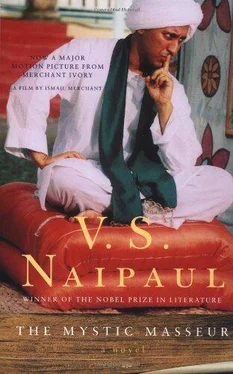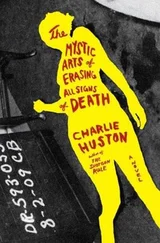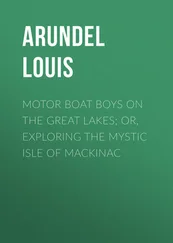And then, one after the other, appeared the two books that made his name a household word in Trinidad.
The first book began: ‘On Thursday, May 2, at nine o’clock in the morning, just after I had had breakfast, I saw God. He looked at me and said …’
What God Told Me must surely rank as a classic in Trinidad literature. Its stark simplicity, almost ingenuousness, is shattering. The character of the narrator is beautifully revealed, especially in the chapters of dialogue, where his humility and spiritual bewilderment counter-point the unravelling of many knotty metaphysical points. There were also some chapters of spirited prophecy. The end of the war was predicted, and the fate of certain local people.
The book set a fashion. Many people in many parts of Trinidad began seeing God. The most celebrated was Man-man of Miguel Street in Port of Spain. Man-man saw God, tried to crucify himself, and had to be put away.
And only two months after the publication of What God Told Me Ganesh scored a stupendous success of scandal. His inspiration was the musical toilet-roll rack. Because Profitable Evacuation was published during the war its title was misunderstood; fortunately, for it might not have been allowed if the authorities knew that it was concerned more or less with constipation. ‘A vital subject,’ Ganesh wrote in his Preface, ‘one that has adversely dogged human relationships since the beginning of time.’ The gist of the book was that evacuation could be made not only pleasurable but profitable, a means of strengthening the abdominal muscles. The system he recommended is roughly that which contortionists and weight-lifters call excavation.
This, printed on thick paper, with a cover of brightest yellow decorated with a lotus, established Ganesh finally, without question.
Left to himself Ganesh might not have taken any further action against Narayan. The Little Bird was only a twitter of protest amid whole-hearted and discerning applause. But people like The Great Belcher and Beharry didn’t like it.
Beharry, in particular, was upset. Ganesh had opened up to him vaster vistas of reading and knowledge; and it was because of Ganesh that he prospered. He had put up his new shop, all concrete and plaster and glass. Land-values in Fuente Grove had risen and he had profited by that too. From time to time he was asked by various Literary-Debating-and-Social-Welfare Societies to talk on aspects of Ganesh’s career: Ganesh the man, Ganesh the mystic, the contribution of Ganesh to Hindu thought. His fate was bound up with Ganesh’s and he, more than anyone, resented Narayan’s attacks.
He did what he could to encourage Ganesh to act.
‘The man attack you again this month, pundit.’
‘ Gaddaha!’
‘But it does look bad bad, pundit. Especially now that Ramlogan beginning to write against you in The Hindu. Is dangerous.’
But Ganesh wasn’t worried that Narayan was preparing for the 1946 elections. ‘I ain’t burning to be one of those damn crooks who does go up for elections.’
‘You hear the latest, pundit? Narayan form a party. The Hindu Association. Is a election stunt, pundit. He ain’t have a chance to win in Port of Spain. He have to come to the country and that is where he frighten you beat him.’
‘Beharry, you and me know what sort of thing Indian associations is in this place. Narayan and those people just like little girls playing dolly-house.’
Ganesh’s judgement was sound. At the first general meeting of the Hindu Association Narayan was elected President. The following were also elected: four Assistant-Presidents, two Vice-Presidents, four Assistant Vice-Presidents; many Treasurers; one Secretary-in-Chief, six Secretaries, twelve Assistant-Secretaries.
‘You see? They ain’t leave nobody out. Look, Beharry, boy, going about talking to all these prayer-meetings, I get to know Trinidad Indians like the back of my own hand.’
But then Narayan began playing the fool. He began sending off cables to India, to Mahatma Gandhi, Pandit Nehru and the All-India Congress; in addition to anniversary cables of all sorts: he noted centenaries, bicentenaries tercentenaries. And every time he sent a cable the news was reported in the Trinidad Sentinel. There was nothing to prevent Ganesh sending his own cables; but in India, where they didn’t know what was what in Trinidad, what chance would a cable signed GANESH PUNDIT MYSTIC have against one signed NARAYAN PRESIDENT HINDU ASSOCIATION TRINIDAD?
The deputation was the work of Beharry.
Two men and a boy came out one Sunday afternoon to Ganesh’s residence. One man was tall, black, and fat. He looked a little like Ramlogan; only, he was dressed in spotless white: his belly was so big it hung over his black leather belt and hid it. In his shirt pocket he carried a letter and a whole row of pens and pencils. The other man was thin, fair, and good-looking. The boy wore short trousers and his shirt-sleeves were buttoned at his wrists. Ganesh had often met the men and knew them as organizers. The boy he didn’t know.
The deputation sat down carefully on the morris chairs in the verandah and Ganesh shouted for Leela to bring put some CocaCola.
The deputation looked through the drawing-room doors and examined the pictures and the two big Coca-Cola calendars on the walls.
Then they saw Leela, thin and elegant in her sari, opening the refrigerator. The fat man nudged the boy sitting next to him on the couch; and the whole deputation stopped staring.
The fat man became businesslike. ‘Sahib, we ain’t come here to beat about the bush. Beharry and your aunt — a nice nice woman, sahib — they ask me to come because of the amount of experience I have organizing prayer-meetings and things like that —’
The Coca-Cola came. Four frosted bottles on a glass-bottomed tray. Leela sighed. ‘Wait jirst one moment. I are going to get the glasses.’
The fat man looked at the bottles. The thin fair man fingered the strip of adhesive-plaster above his left eye. The boy looked at the tassels on Ganesh’s scarf. Ganesh smiled at them all in turn and they all smiled back, except the boy.
On another glass-bottomed tray Leela brought expensive-looking glasses of great beauty, arabesqued in gold, red, and green and ringed with gold bands.
The deputation held their glasses in both hands.
There was an awkward silence until Ganesh asked the fat man, ‘What you doing these days, Swami?’
Swami took a sip of Coca-Cola, a refined lilliputian sip. ‘Jirst living, sahib.’
‘Jirst living, eh?’ Ganesh smiled.
Swami nodded and smiled back.
‘And what happen to you, Partap? I see you cut yourself, man.’
‘A little accident in Parcel Post,’ Partap said, fingering the adhesive-plaster.
Ganesh had always thought of this man as Partap of Parcel Post. He managed to bring in the Parcel Post into almost any conversation, and Ganesh knew that to annoy him you only had to suggest that he worked in the Post Office. ‘Parcel Post, please,’ he would say coldly.
Silence, for three little sips of Coca-Cola.
Swami put down his glass with decision, but with unintentioned violence, and Leela came and stood at one of the drawing-room doors. Swami took up his glass again and smiled. ‘Yes, sahib,’ he said, with great cheerfulness. ‘We ain’t come here to beat about the bush. You is the only man with authority among all Trinidad Indians to stand up to Narayan. We don’t approve of the way Narayan attacking you. We come here today, sahib’ — Swami became solemn — ‘to ask you to form up your own own association. We go make you President straightaway and — you ain’t have to look very far — you have three Assistant-Presidents sitting down quiet quiet in front of you drinking Coca-Cola.’
Читать дальше












